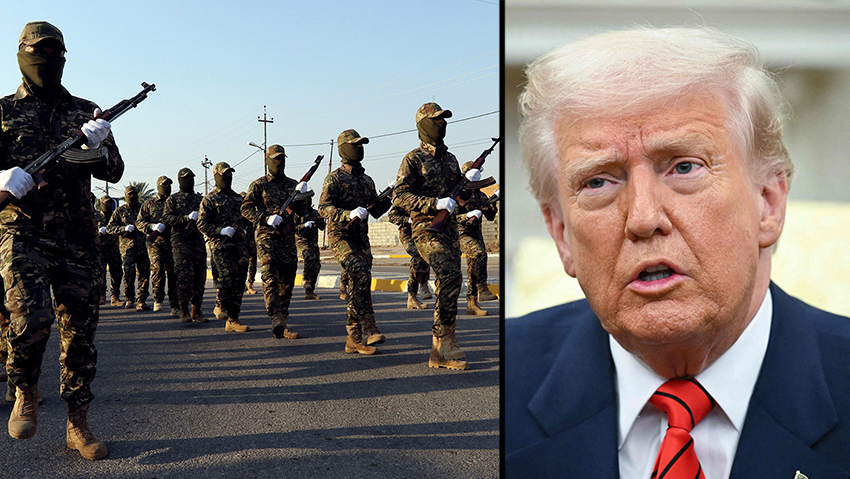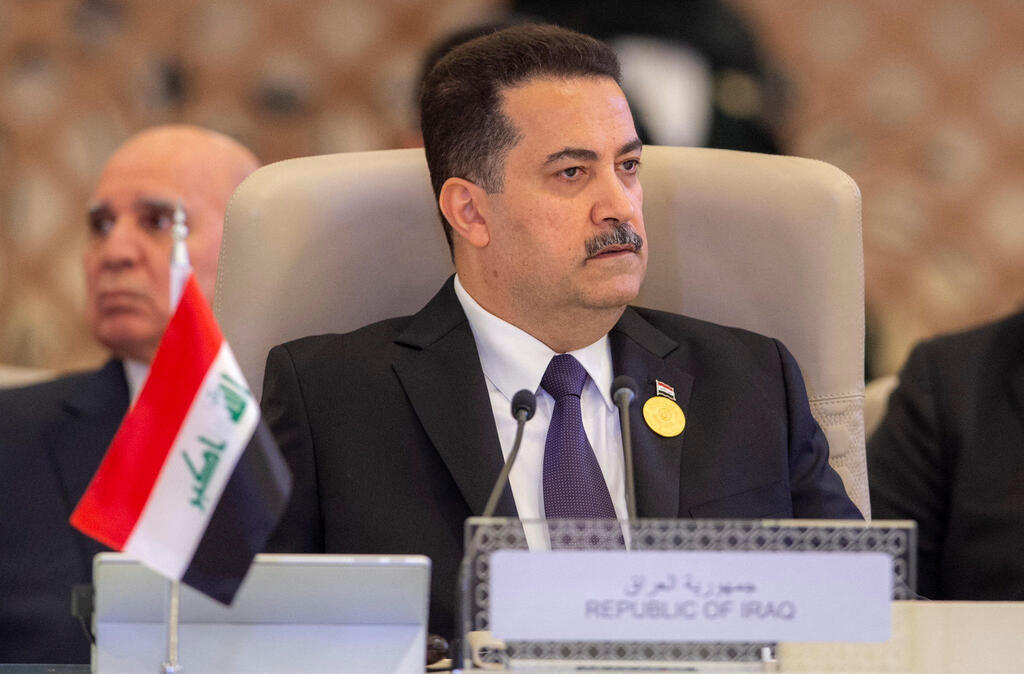Getting your Trinity Audio player ready...
Four powerful pro-Iranian militias in Iraq, including Kataib Hezbollah, are ready for the first time to disarm in order to avoid confrontation with the United States, Reuters reported on Monday.
According to the report, based on conversations with six local militia commanders and four additional Iraqi officials, discussions are currently taking place between the militias and the Iraqi government regarding the disarmament process. One idea being considered is the integration of militia fighters into Iraq's official armed forces.
Sources said the negotiations began following repeated private threats from Washington to Baghdad’s government since Donald Trump returned to the White House in January. The sources warned that if the militias do not disarm, the U.S. may launch airstrikes against them.
Izzat al-Shabandar, a senior Shiite politician close to Iraq’s government, stated that discussions between Prime Minister Mohammed Shia al-Sudani and several militia leaders are in a "very advanced" stage and that the militias are inclined to comply with the American demands.
"The factions are not acting stubbornly or insisting on maintaining their current form," he said, adding that the militias are "fully aware" of the possibility of being attacked by the U.S. military, especially in light of Iran's other proxy, the Houthis in Yemen, currently being subjected to extensive airstrikes.
The commanders who spoke with Reuters belong to Kataib Hezbollah—the most powerful Shiite militia in Iraq, which, despite its name, has no direct connection to Hezbollah in Lebanon—and other militias including Al-Nujaba, Sayyid al-Shuhada and Ansar Allah al-Awfiya.
"Trump is willing to escalate the war against us to much worse levels; we know that and we want to avoid such a disastrous scenario," said a Kataib Hezbollah commander who, according to Reuters, spoke while wearing a black mask and sunglasses.
Background of the disarmament talks
Last week, reports surfaced that Iran had "abandoned" the Houthis and withdrew its personnel from Yemen. Reuters noted that the commanders emphasized that they had received a green light from Tehran for the disarmament discussions. According to the sources, Iran's powerful Quds Force has given its "blessing" to any decision the militias deem necessary to avoid a "destructive confrontation" with the U.S. and Israel.
The four militias considering disarmament are part of a larger coalition of about 10 pro-Iranian militias, collectively known as the Islamic Resistance in Iraq. Two Iraqi security officials monitoring their activities said these militias collectively comprise approximately 50,000 fighters and possess an arsenal that includes long-range missiles and air defense systems.
These militias joined the fight against Israel alongside Hezbollah in Lebanon and the Houthis in Yemen following Hamas’ terror attack on October 7. Throughout the war, they launched dozens of missiles and drones toward Israel and U.S. forces in the region, with one deadly attack killing three American soldiers at a base near the Jordan-Syria border.
In recent months, particularly since Trump’s return to power, the militias have halted their attacks, and calm has largely prevailed on this front, even after the ceasefire in Gaza collapsed last month. In contrast, Houthis resumed their missile launches toward Israel. Alongside concerns over U.S. retaliation, the collapse of the Assad regime in Syria has also hindered the militias' ability to carry out drone strikes from Syrian territory, as Iraq's more distant geography makes such attacks against Israel less effective.
Security measures and political implications
Commanders and sources cited in the report noted that since mid-January, some militias have significantly reduced their presence in major cities such as Mosul and Anbar, fearing airstrikes. Many commanders have also increased their personal security measures, including frequently swapping mobile phones, vehicles and sleeping locations.
Farhad Ala al-Din, a foreign affairs advisor to Prime Minister al-Sudani, stated in response to Reuters’ report that al-Sudani is committed to bringing all weapons in Iraq under state control "through constructive dialogue with various national actors." Two Iraqi security officials added that al-Sudani is determined to disarm all militias under the Islamic Resistance umbrella, not just the four currently negotiating, as these groups openly declare loyalty to Iran rather than to Baghdad’s government.
A US base attacked by pro-Iranian militias
Meanwhile, the U.S. State Department reiterated that it continues to urge Iraq to assert control over the militias: "These forces must answer to the commander-in-chief of Iraq's military, not to Iran." A U.S. official, speaking anonymously, noted that past American pressure has already led to the militias halting their attacks. However, despite their positive signals, he expressed doubt that any disarmament effort would be lasting.
Al-Shabandar emphasized that no agreement with the militias has yet been finalized, and the mechanism for disarmament is still under discussion. He noted that one option being considered is integrating the militias into Iraq’s official armed forces and transforming them into political parties.
Broader regional implications
If the militias do disarm, it would mark another blow to the Shiite "Axis of Resistance" that Iran has spent decades and vast financial resources building, following Hezbollah’s weakening in Lebanon and the collapse of the Assad regime in Syria. The Shiite militias in Iraq were established in the chaos following the U.S. invasion of 2003, which toppled Saddam Hussein’s Sunni regime. With Iran’s financial and military support, the militias became a massive military force rivaling the capabilities of the Iraqi army.
Get the Ynetnews app on your smartphone: Google Play: https://bit.ly/4eJ37pE | Apple App Store: https://bit.ly/3ZL7iNv
Iraq, under the leadership of the relatively moderate Shiite al-Sudani, is currently balancing parallel alliances with both the U.S., which still maintains forces in the country, and neighboring Iran. Some of the sources who spoke to Reuters mentioned that Defense Secretary Pete Hegseth demanded in a phone call with al-Sudani on March 16—shortly after the strikes on the Houthis began—that he prevent the militias from launching retaliatory attacks against Israel or U.S. bases in the region.
Ibrahim al-Sumaidaie, a liberal activist and former advisor to al-Sudani, told Iraqi television that while the U.S. has long demanded Iraq’s leadership disarm the Shiite militias, it may be an ultimatum this time. "If we do not comply willingly, it may be imposed on us from the outside—by force."






